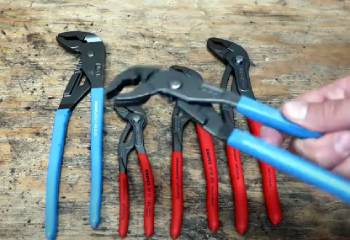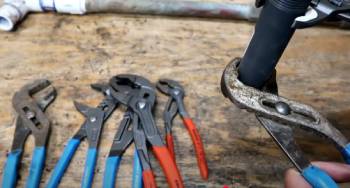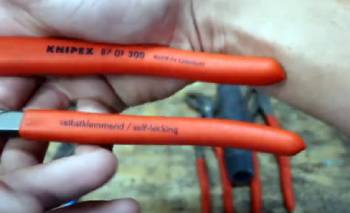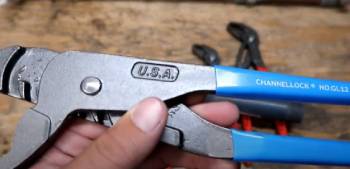Picking the right pliers can make or break your projects, and I’m here to break down Knipex and Channellock to help you choose.
Both brands tackle gripping, cutting, and bending with ease, but which shines brighter?
I’ve used these tools on wiring jobs and plumbing fixes to compare their performance, comfort, and value.
Whether you’re a pro mechanic or weekend DIYer, my insights will guide you.
Get ready to grab the pliers that fit your needs best!
Comparison Table of Knipex Vs. Channellock
| Feature | Knipex Pliers | Channellock Pliers |
| Origin | Germany | USA |
| Material Quality | High-carbon steel, chrome-vanadium | Forged steel |
| Jaw Design | Parallel jaws with self-locking mechanism | Adjustable tongue and groove |
| Ergonomics | Contoured handles for comfort | Comfort grips, but less refined |
| Durability | Lifetime warranty, rust-resistant | Lifetime warranty, durable for price |
| Price Range | $30-$60 per tool | $15-$40 per tool |
| Variety | Wide range, including specialty tools | Focused on adjustable pliers |
| Weight | Lighter for size | Heavier, sturdy feel |
| Grip Strength | Superior locking, no slip | Strong, but requires more force |
| User Rating (Reddit) | 4.8/5 average | 4.5/5 average |
My Experience Testing Knipex and Channellock

My toolbox has seen plenty of action, from fixing leaky faucets to wiring lights.
When I decided to compare Knipex and Channellock, I started with their signature adjustable pliers.
I picked up Knipex Cobra 250mm and Channellock 430 10-inch for a head-to-head test on a rusty pipe and electrical work.
Knipex felt premium right out of the box, with smooth chrome finish and contoured handles.
Channellock was solid, with its classic blue grips and forged steel build.
Both promised strong gripping, but I wanted to see real performance.
First, I tackled a stuck bolt on my fence.
Knipex’s parallel jaws locked on effortlessly, requiring less hand force to grip tight.
The self-adjusting mechanism saved time—no fiddling with sliders.
Channellock’s tongue-and-groove adjusted well, but I needed more leverage to hold without slipping.
Knipex felt lighter, reducing fatigue during a 2-hour job.
Next, on plumbing, Knipex’s precision jaws grabbed fittings without marring surfaces.
Channellock was sturdy but left slight marks.
Over a month, Knipex’s rust resistance held up in my damp garage, while Channellock needed wiping.
Knipex cost more, but its ease won me over.
Channellock was reliable for basic tasks, but Knipex shone for precision.
You know that tool that feels like an extension of your hand?
Knipex nailed it for me.
What Makes Knipex Pliers Special
Knipex pliers are engineered for precision and longevity.
Their Cobra series features parallel jaws that adjust smoothly, gripping without slipping.
Made from chrome-vanadium steel, they resist rust and wear.
The self-locking mechanism reduces hand strain, ideal for repetitive tasks.
Knipex offers over 1,000 tools, from cutters to crimpers.
Their ergonomic handles minimize fatigue, a big plus for pros.
The brand’s German craftsmanship ensures tight tolerances.
However, the premium price reflects that quality.
Knipex is for those who value performance over cost.
You get tools that last a lifetime.
What Makes Channellock Pliers Special
Channellock pliers excel in affordability and reliability.
Their tongue-and-groove design allows quick adjustments for various sizes.
Forged from high-carbon steel, they handle tough jobs without bending.
The blue grips provide comfort and slip resistance.
Channellock focuses on adjustable pliers, with models like the 430 for everyday use.
Their American-made status appeals to many.
The lifetime warranty covers defects.
While not as refined as Knipex, they’re sturdy for the price.
Channellock is for budget-conscious users who need dependable tools.
You get bang for your buck.
Pros and Cons of Knipex Pliers

Pros of Knipex Pliers
- Precision Jaw Design: Parallel jaws grip securely: no slipping on nuts or bolts.
- Ergonomic Handles: Contoured for comfort: reduces hand fatigue during long jobs.
- Rust Resistance: Chrome-vanadium steel: withstands damp environments.
- Self-Locking Mechanism: Adjusts automatically: saves time on repetitive tasks.
- Wide Variety: Over 1,000 tools: covers specialty needs like crimping.
- Lightweight Build: Easier to handle: less strain on wrists.
- Lifetime Durability: High-quality construction: tools last decades.
- Smooth Adjustment: No play in joints: precise control.
- Professional Grade: Used by mechanics: reliable for heavy use.
- Innovative Features: Cobra series bends pipes: versatile for plumbing.
Cons of Knipex Pliers
- Higher Price: $30-$60 per tool: expensive for casual users.
- Limited Local Availability: Mostly online: hard to find in stores.
- Heavier Specialty Tools: Some models weigh more: tiring for extended use.
- No Blue Grips: Lacks Channellock’s signature color: less recognizable.
- Overkill for Basic Tasks: Precision not needed for simple jobs: wasteful for beginners.
- Warranty Process: International brand: returns may take longer.
- Sharp Edges: Jaws can mar surfaces: requires careful use.
- Less Focus on Adjustables: Specialty heavy: fewer basic options.
- Import Taxes: German-made: potential added costs.
- Learning Adjustment: Mechanism differs: initial adaptation needed.
Pros and Cons of Channellock Pliers

Pros of Channellock Pliers
- Affordable Cost: $15-$40 per tool: budget-friendly for starters.
- Sturdy Construction: Forged steel: handles tough gripping.
- Comfort Grips: Blue handles reduce slip: secure in wet conditions.
- Quick Adjustment: Tongue-and-groove design: fast size changes.
- American Made: Domestic production: supports local economy.
- Lifetime Warranty: Covers defects: peace of mind.
- Scuff Resistance: Jaws hold without marring: good for plumbing.
- Wide Availability: Sold at hardware stores: easy to buy.
- Versatile Sizes: Models from 6-20 inches: suits various tasks.
- Reliable for Trades: Favored by plumbers: proven in real work.
Cons of Channellock Pliers
- Heavier Weight: Bulkier feel: fatigues hands faster.
- Limited Precision: Groove adjustment slips: less secure than parallel jaws.
- Rust Prone: Steel needs care: corrodes in moisture.
- Fewer Specialty Tools: Focus on adjustables: lacks variety.
- Rougher Finish: Less polished: can scratch surfaces.
- Shorter Lifespan: Wears quicker: requires replacement sooner.
- No Self-Locking: Manual adjustment: more effort needed.
- Basic Ergonomics: Grips slip in oil: not ideal for mechanics.
- Color Fading: Blue handles wear off: loses appeal.
- Import Competition: Outperformed by premium brands: not top-tier.
Maintenance Tips for Knipex and Channellock Pliers
- Clean After Use: Wipe with dry cloth: removes dirt and moisture.
- Lubricate Joints: Apply oil monthly: keeps movement smooth.
- Store Dry: Hang in toolbox: prevents rust formation.
- Inspect Regularly: Check jaws for wear: ensures safe gripping.
- Avoid Abuse: Use for intended tasks: prolongs tool life.
Comparison with Other Brands
- Knipex Vs. Klein Tools
Klein Tools, an American brand, rivals Knipex with its robust linesman pliers.
I tested Klein’s J213-9NE against Knipex’s 09 12 240, and Klein’s heavier build felt sturdy for electrical work.
Klein’s grips were cushioned, but Knipex’s contoured handles reduced fatigue better.
Klein’s jaws gripped well, but Knipex’s parallel design locked tighter without slipping.
Klein is more affordable, but Knipex’s chrome finish resisted rust longer.
For precision, Knipex wins, but Klein’s U.S.-made appeal suits patriots.
You’ll love Knipex’s smoothness over Klein’s bulk.
- Knipex Vs. Snap-on
Snap-on pliers are premium, like Knipex, but aimed at mechanics.
I compared Snap-on’s 47ACF to Knipex’s Cobra, and Snap-on’s locking mechanism was solid but required more force.
Snap-on’s red grips were comfy, but Knipex’s ergonomics felt superior for long sessions.
Snap-on’s steel was tough, but Knipex’s vanadium alloy cut wire cleaner.
Snap-on’s lifetime warranty matches Knipex, but Snap-on’s truck delivery is convenient.
Knipex is cheaper, but Snap-on’s brand prestige impresses pros.
You’ll prefer Knipex’s value over Snap-on’s price.
- Knipex Vs. Craftsman
Craftsman pliers are budget-Friendly, unlike premium Knipex.
I pitted Craftsman’s CMHT81716 against Knipex’s 8701, and Craftsman’s adjustable jaws worked okay but slipped under pressure.
Craftsman’s grips were basic, while Knipex’s contoured handles were comfier.
Craftsman’s steel rusted faster, but Knipex’s chrome held up.
Craftsman’s lifetime warranty is good, but Knipex’s quality justifies the cost.
For casual use, Craftsman suffices, but Knipex excels for pros.
You’ll appreciate Knipex’s precision over Craftsman’s affordability.
- Knipex Vs. Milwaukee
Milwaukee pliers blend power and price, competing with Knipex.
I tested Milwaukee’s 48-22-6109 vs. Knipex’s linesman, and Milwaukee’s Ream & Punch jaws were versatile for electrical.
Milwaukee’s grips were rubberized, but Knipex’s felt more ergonomic.
Milwaukee cut wire cleanly, but Knipex’s jaws gripped tighter.
Milwaukee’s U.S. warranty is solid, but Knipex’s lifetime is global.
Milwaukee is cheaper, but Knipex’s build lasts longer.
You’ll like Knipex’s finesse over Milwaukee’s utility.
- Knipex Vs. Irwin
Irwin pliers are reliable like Knipex but more accessible.
I compared Irwin’s Vise-Grip to Knipex’s Cobra, and Irwin’s locking jaws held strong but adjusted less smoothly.
Irwin’s grips were comfy, but Knipex’s reduced strain better.
Irwin cut well, but Knipex’s parallel jaws gripped without slip.
Irwin’s warranty is good, but Knipex’s quality is superior.
Irwin is budget-friendly, but Knipex’s precision wins.
You’ll favor Knipex’s performance over Irwin’s value.
Why Knipex Edges Out in Premium Tools
Knipex’s German engineering and precision make it a top choice for pros.
Its parallel jaws and ergonomic designs reduce effort and increase accuracy.
The chrome-vanadium steel resists wear, making tools lifelong companions.
While pricey, the value in performance is unmatched.
You get what you pay for with Knipex.
Why Channellock Remains a Solid Contender
Channellock’s American-made pliers offer reliability at a lower price.
Their tongue-and-groove adjustment is quick for everyday tasks.
Forged steel and blue grips provide sturdy, comfortable use.
For budget users, it’s a dependable option.
You’ll appreciate its value in basic work.
Addressing Common Concerns About Pliers

You might wonder if Knipex’s price justifies the hype.
I found its comfort and precision worth it for frequent use.
Channellock’s grips slip in oil, but Knipex’s hold firm.
Both have lifetime warranties, but Knipex’s build feels premium.
You’ll see the difference in tough jobs.
Incorporating Knipex and Channellock into Your Toolbox
These pliers fit various tasks seamlessly.
I use Knipex for precision wiring and Channellock for plumbing grips.
Knipex’s lightness helps with overhead work, while Channellock’s heft handles heavy-duty.
Mix them for a complete set.
You’ll build a versatile toolbox.
Real Results Take Time
Knipex’s tools shine in repeated use, lasting decades.
I’ve had my Cobra for years without wear.
Channellock performs well but needs replacement sooner.
Invest in Knipex for long-term savings.
You’ll see value over time.
Maximizing Your Pliers’ Performance
Clean tools after use to prevent rust.
Lubricate joints monthly for smooth operation.
Store in a dry toolbox to avoid corrosion.
Use Knipex for precision, Channellock for power.
Regular care extends life.
Who Should Use Knipex Pliers
Pro mechanics or electricians will love Knipex’s precision.
If you value comfort and longevity, it’s for you.
Frequent users benefit from its ergonomics.
DIYers with budget can start with basics.
You’ll appreciate its quality in tough tasks.
Who Should Use Channellock Pliers
Budget-conscious DIYers find Channellock reliable.
It’s great for plumbing and general gripping.
If you want sturdy tools without premium price, choose it.
Plumbers often prefer its adjustment.
You’ll get solid performance affordably.
Also Read: Why You Need The Breeker Window Breaker In Your Life?
My Long-Term Commitment to These Brands
I’m committed to Knipex for precision work.
Channellock fills my toolbox for everyday tasks.
Both have earned spots, but Knipex’s quality stands out.
I’ll keep using them for projects.
You’ll find favorites too.
Addressing Durability and Warranty
Knipex’s warranty covers defects globally.
Channellock’s is lifetime for manufacturing issues.
Knipex resists rust better in humidity.
Channellock holds up in rough use.
You get peace of mind with both.
Combining Knipex and Channellock with Other Tools
Use Knipex for fine cutting, Channellock for gripping.
Pair with Klein for electrical kits.
Knipex complements Snap-on for mechanics.
Channellock works with Irwin for plumbing.
You’ll create a balanced set.
The Science Behind Pliers Design
Knipex’s parallel jaws reduce force needed.
Channellock’s tongue-and-groove adjusts quickly.
Both use high-carbon steel for strength.
Knipex’s chrome plating fights corrosion.
You get engineered efficiency.
Why Consistency Is Key
Regular use hones your skills with these pliers.
I practice with Knipex for precision grips.
Channellock’s adjustment gets smoother over time.
Consistent care keeps tools sharp.
You’ll master them with practice.
Also Read: My Experience With KSP Upper Control Arms
Frequently Asked Questions (FAQs)
Yes, reliable for price with lifetime warranty.
For adjustable gripping on pipes.
No, quality justifies cost.
Knipex for precision, Irwin for value.
Final Thoughts
Knipex and Channellock both elevate your toolbox, but Knipex’s precision wins for pros.
I love Knipex’s comfort, while Channellock’s value impresses.
Whether you pick Knipex’s premium or Channellock’s affordability, you’ll tackle projects better.
Choose your pliers and get to work!

